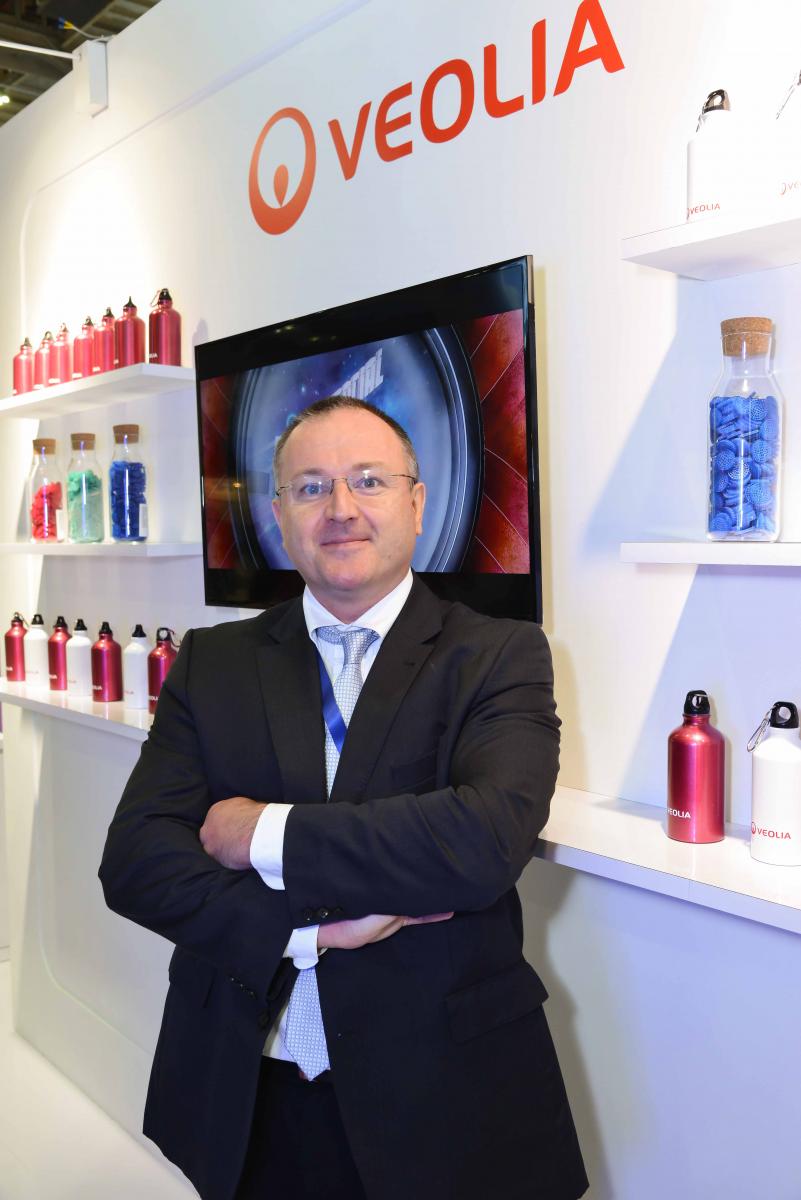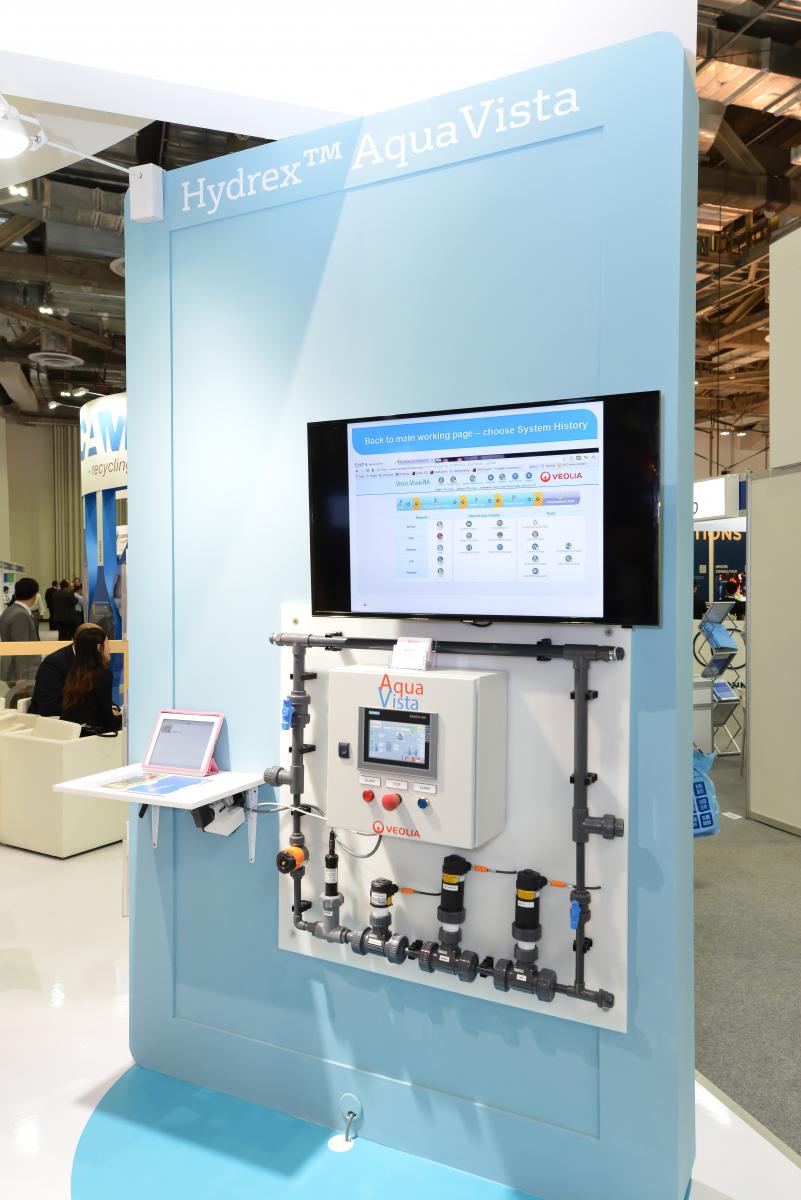Exclusive interview wth Frédéric Théry:
Since becoming the CEO of Veolia Water Technologies APAC, what significant changes have been introduced to the company?
In December 2015, the Veolia Group presented a new strategic plan for the period of 2016 - 2018, targeting an average of 2 to 3 percent revenue growth per year. The new growth plan focuses heavily on two main drivers: revenue growth and continued improvement in operational efficiency.
This plan is something that we have been working on at Veolia since I came on board. We are streamlining our operations to provide our customers with greater efficiencies, and to attain greater synergy within the different departments in Veolia. It is our goal to align the organization, so that ultimately, Veolia can be more agile, more integrated, and more efficient. Since the start of this year, internal measures have already been implemented to support the Group’s transformation plan.

In the APAC, what is market response to new wastewater recovery solutions?
The Food & Beverage (F&B) market is one of Veolia’s six priority segments of growth. There is much potential for us in this industry due to rising economic activities in Asia, that will lead to increased water usage. As a fundamental component for F&B business processes, water use is essential, and demand will only escalate as the industry expands, resulting in greater volumes of wastewater.
More and more, local authorities are establishing mandatory discharge standards for F&B manufacturers. In this regard, we see that companies are actively engaging professional water solutions specialists like Veolia to mitigate their wastewater challenges. Apart from making sure that wastewater is treated before discharge, Veolia adopts a proactive approach to encourage water conservation through its suite of water reuse technologies. Some of our solutions also produce biogas, which can be used as an alternative energy source for heating boiler systems in the F&B industry.
Market leaders like Associated British Foods in Thailand, Bacchus in China, and other notable beverage and brewery giants operating in Asia are positively influencing the industry with their actions – by implementing wastewater recovery solutions in their facilities. We foresee that F&B companies operating in Asia will continue to be more savvy with their water and wastewater management, and Veolia’s experts will remain committed to providing technical advice and support to our existing and potential future clients.
How do you view the ASEAN market for Veolia’s technologies and services over the past year?
As previously mentioned, rising economic activities will eventually result in increased water usage and even greater volumes of wastewater. Additionally, population growth in ASEAN will influence the overall demand for water resources and affect how water is being managed. Water scarcity threats are becoming increasingly prevalent in this region, hitting closer to home than ever, with Malaysia currently practicing water rationing due to droughts. As climate change reduces the amount of rainfall, water shortage will be more acutely felt as the population continues to grow. All of these factors are opportunities for Veolia to support manufacturers in this region.
With Veolia’s technologies, industry leaders in Asia – such as L’Oreal in Indonesia and Malaysia’s Tun Razak Exchange project (TRX) in Kuala Lumpur – have been able to achieve significant water savings and engage in more efficient water use within their manufacturing processes.
How important is the ASEAN market for the company?
Without a doubt, this market is important to Veolia. In December 2015, Veolia launched an initiative, Think Tank Asia, to gather decision makers from all industries to uncover sustainable business innovations in the region. We then held Think Tank Asia 2 in July this year, to urge leaders to explore future business models and to spread environmental awareness in Asia. Both events concluded successfully and we were able to inspire attendees to explore options beyond the perceived limitations of their current business models. Separately, we actively participate in regional trade events to increase Veolia’s profile in the ASEAN market. This allows us to bring greater awareness to our technologies and services, and gives us an opportunity to connect directly with our customers in this region.
What are the challenges in delivering water and wastewater solutions to potential customers in developing countries?
In developing countries, the challenge that manufacturers face is usually in the local water and wastewater infrastructure. Additionally, regulations in these countries may not be as rigidly enforced, so local manufacturers may not be as encouraged to invest in comprehensive water and wastewater solutions.
Many of our clients are global manufacturers who have operations in different parts of the world, including the developing countries. These industry leaders typically have their own internal standards to uphold, so no matter the region that they are in, these companies implement the same discharge practices across their global operations. Slowly but surely, these international companies are influencing local manufacturers in developing countries to adopt their water and wastewater practices. This is especially significant for facilities located in water stressed regions, as these strategies can help companies to safeguard and ensure their business continuity.
Please describe the partnership Veolia offers its customers. Are there recommendations for SMEs?
At Veolia, we believe in building sustainable, long-lasting relationships with our customers. Regardless of the size of the manufacturer’s operations, our portfolio of water and wastewater technologies can be integrated across industries. Most of our clients are ones that we have worked with for many years, and Veolia has supported them even as they set up new operations in new continents. We pride ourselves as a one-stop shop, due to our abilities to supply our clients with a full range of support – from providing consultation to designing turnkey solutions, and building recommended technologies.
Flexibility is one of the key features and advantages of our technologies. Regardless of the location – urban or rural, water or wastewater challenges – Veolia can customize targeted solutions to achieve the highest performance for our clients.

Designed for integrated management of water treatment systems, Aquavista™ 5C excels in remote monitoring, allowing information access through the Aquavista™ 5C portal on a smart phone or tablet
Is Veolia introducing new technology, services, or solutions for customers in the region in 2017?
Research and development activities are at the core of Veolia’s operations. We regularly invest in research and development (R&D) activities to expand efforts into developing even more sustainable solutions for our clients. For example, Veolia’s new MBBR Pack, a modular package solution based on Veolia’s AnoxKaldnes™ biofilm principle for treating wastewater, was recently developed to tackle specific problems and fulfil quality objectives of municipal and industrial clients. With its plug-and-play function, the MBBR Pack is easy to install and is ideal for clients wanting to be equipped with wastewater solutions quickly.
Earlier in July, Veolia launched another new solution – the HYDREX™ AquaVista (Aquavista™ 5C) – to manufacturers operating in Asia, at the Singapore International Water Week (SIWW). Specially designed for integrated management of water treatment systems, Aquavista™ 5C excels in remote monitoring, allowing information access through the Aquavista™ 5C portal on a smart phone or tablet. This enables manufacturers to retrieve equipment status performance and data from any location instantly, and it facilitates fast reaction times when readings deviate from standard parameters.
Increasingly, Asian manufacturers are developing their corporate environmental agendas and becoming more active in implementing sustainable solutions. Veolia is committed to support manufacturers here, and will push out new innovative water and wastewater solutions as they become ready for market.
What industry-related developments do you see happening in the APAC next year?
Already today, 700 million people in 43 countries live in water scarce regions, and it is expected that 1.8 billion people will be living in regions with absolute water scarcity by 2025[i]. With water scarcity threats becoming prominent in Asia Pacific, we believe that this will influence more manufacturers to consider moving towards water conservation and adoption of reuse technologies such as water harvesting and recycling to improve their water footprint.
Separately, as local authorities tighten environmental regulations, we see more opportunities opening up as manufacturers are now turning to water specialists for water and wastewater management support. Governments and businesses in Asia need to view water as a critical resource and implement steps to protect water safety and ensure availability. Businesses drive global economic development, and manufacturers need to consider the impact that their business activities can have on the water environment. As large consumers of water resources, manufacturers need to be more mindful of and responsible for their water footprint by practicing sustainable water management.
[i] United Nations Department of Economic and Social Affairs (UNDESA), Water for Life Decade, Water Scarcity, http://www.un.org/waterforlifedecade/scarcity.shtml
Air Max Shox 2018














